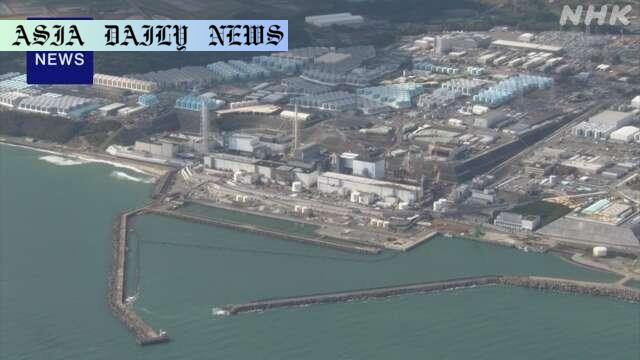Seawater samples analyzed by Chinese experts reveal no harmful effects from discharged treated water near Fukushima plant.
- Chinese experts tested seawater near Fukushima for signs of radiation changes.
- No significant abnormalities were found in the samples analyzed.
- The findings may influence China’s decision on reinstating Japanese seafood imports.
- The tests highlight the need for continuous monitoring of wastewater discharge.

Background on Fukushima Discharge Monitoring
The Fukushima Daiichi nuclear power plant became the center of global attention following the devastating earthquake and tsunami in 2011, which critically damaged its reactors. Since then, managing the contaminated wastewater, which is treated to remove most radioactive materials except tritium, has been a significant challenge. The Japanese plant operator began releasing treated and diluted water into the ocean last year, sparking concerns over the environmental impact and marine life safety. These concerns have also affected international trade, including China’s importation of Japanese seafood.
China’s Independent Seawater Analysis
In October last year, Chinese experts collected seawater samples near the Fukushima plant to evaluate the potential impact of the discharged treated water. Chinese research institutes completed their analysis recently and reported that no abnormalities or significant changes in radioactive substance concentrations were found in the collected seawater. According to The Global Times, a state-affiliated Chinese media agency, the tests did not indicate adverse effects on marine life in the area.
Limitations of the Study
While the findings are positive, the report explicitly pointed out the limitations of a single set of results. Continuous monitoring and independent assessments are essential to determine long-term effects, if any, of the treated water discharge process. Stakeholders like China have committed to sustained sampling and analysis, reflecting their cautious approach toward ensuring environmental safety and public health.
The Role of Tritium in Treated Water
Although most radioactive materials are removed during treatment, tritium remains in the wastewater. Tokyo Electric Power Company (TEPCO), the plant operator, dilutes the treated water to reduce tritium concentrations to about one-seventh of the World Health Organization’s guideline for drinking water levels. Scientists generally believe that tritium, in such diluted concentrations, poses negligible risk to humans and marine ecosystems, but public skepticism persists due to the plant’s history.
Trade Tensions and Seafood Import Bans
China has remained critical of Japan’s decision to release the water, resulting in suspended imports of Japanese seafood products. Beijing has cited health concerns, urging for careful monitoring of the discharged water’s impact. Japan, on the other hand, has sought to reassure the international community by working closely with the International Atomic Energy Agency (IAEA), which maintains oversight of the process. In September, both nations agreed to work on rebuilding trust, with China promising to gradually resume seafood imports after further data and monitoring.
Environmental and Economic Implications
The release of treated and diluted wastewater remains a contentious issue, underscoring the balance between environmental stewardship and economic recovery. For affected Japanese seafood exporters, restoring trade relations with China is critical, while Beijing continues to maintain its stance of prioritizing public safety. These developments highlight the broader interplay between environmental science, geopolitics, and international trade, as nations navigate the complex aftermath of a nuclear disaster.
The Path Forward
The latest findings from China’s independent tests are a positive step toward understanding the impacts of Japan’s water discharge process. They may potentially pave the way for improved diplomatic relations and resumption of trade. However, the need for long-term monitoring and transparency remains crucial to addressing global skepticism and securing endorsement from all stakeholders.
Conclusion
The absence of abnormalities in China’s seawater tests signifies a moment of cautious optimism. Meeting the delicate balance between sustainable environmental practices and economic cooperation will require ongoing scientific monitoring, transparent communication, and multilateral collaboration. How these efforts progress will undoubtedly shape the future of Japan-China relations and the global perception of nuclear waste management practices.



Commentary
The Importance of Independent Monitoring
China’s decision to independently examine the effects of the treated water discharged from the Fukushima Daiichi plant is both strategic and necessary. While the International Atomic Energy Agency oversees such processes, countries like China have legitimate concerns related to public health, environmental safety, and economic interests, such as seafood trade. This analysis helps build transparency and trust, fostering more informed discussions on nuclear waste management.
Balancing Economic and Environmental Concerns
For Japan, managing the perception and reality of safety regarding the treated water is critical not only for its domestic population but also for international trade partners. China’s import ban on Japanese seafood has economically strained the fishing industry, calling for swift yet cautious resolutions. Transparency, as demonstrated by these independent tests, plays a crucial role in shaping public trust and diplomatic outcomes.
A Collaborative Path Ahead
The findings of no abnormalities in the seawater are encouraging, but they should not signal complacency. As the Japanese government and TEPCO navigate the long-term management of treated water, continued collaboration with countries like China and institutions like the IAEA will be vital. Only through a united, science-backed approach can stakeholders ensure both environmental safety and economic stability.
Final Reflections
Ultimately, the Fukushima discharged water issue underscores the challenge of balancing science, diplomacy, and economic imperatives in a globalized world. Independent testing initiatives—like China’s—highlight the need for collective responsibility and accountability when addressing cross-border environmental challenges. It is only through clear communication and sustained cooperative efforts that nations can move forward together.